I don’t agree with everything Rassie Erasmus says or does. Far from it, in fact.
But I have to say South African rugby owes him a huge amount because of his desire to do what’s best for his nation. I have really warmed to him over the last couple of years due to his sheer force of character. There is no doubt Erasmus hit the nail on the head in 2022 when speaking to the Mail on Sunday.
He said: ‘People say the English system is the envy of the world because it has all the resources. I disagree. People say South Africa are stupid for allowing our players to leave.
‘Is it stupid? Look at England, there are six or seven South African players taking the places of young English players at Premiership clubs. For us, it’s wonderful.
‘Is it good for England? No.’
Absolutely spot on.
Rassie Erasmus has urged that South African rugby stars playing the UK is a ‘wonderful’ thing

According to Premiership and RFU rules, the country’s 10 top clubs must have an average of 15 English qualified players (EQP) in their matchday squads of 23 across the season
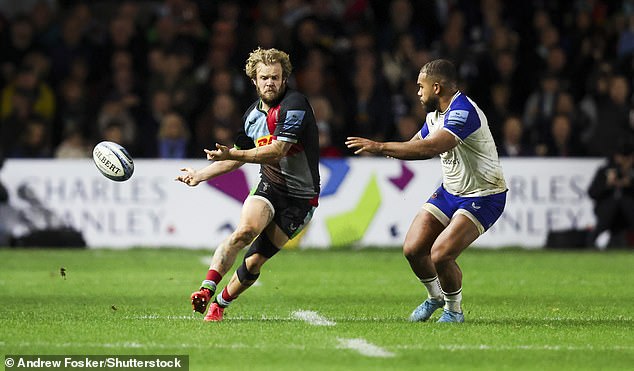
Harlequins’ Tyrone Green (centre) is one of several South Africans playing in the Premiership
In the two years since Erasmus made those comments, English rugby has looked to make significant changes to improve this issue. At the start of this season, the RFU and Premiership Rugby confirmed they had co-created the Professional Game Partnership – the system by which the English game will be run moving forwards.
The aim was to establish, in their own words, ‘world-leading English teams and thriving professional leagues delivered through a fully optimised performance system in partnership with our players.’ Such a target is to be applauded. English rugby is doing many things right and seems to be moving in the right direction. But is it enough?
England should always be striving to be the No 1 rugby country on the planet. But how they get there is important. The detail is key.
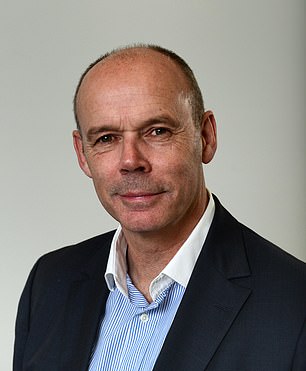
World Cup-winning head coach and Mail Sport columnist Sir Clive Woodward
Premiership and RFU rules state the country’s 10 top clubs must have an average of 15 English qualified players (EQP) in their matchday squads of 23 across the season.
This means that on each Premiership weekend, 150 of the 230 players who are involved in match action should be eligible to play for England. That equates to 65 per cent.
That is good, but for me it does not go far enough. My view is the EQP number in a squad of 23 should be 18, thus equating to 78 per cent.
That might seem a small difference, but it would make a huge impact on creating a world-class England set-up. Here’s why. The first few rounds of this season’s Premiership have made for excellent viewing. The standard of rugby and the entertainment has been high.
It has been great to see young English players like Afolabi Fasogbon get a chance.
But more needs to be done. It is my opinion that in the Premiership right now, there are still too many non-English qualified players who aren’t of the highest standard blocking the development of the next generation of England stars. Let me explain more.
In the past, the Premiership has had numerous international stars whose profile, experience and world-class ability not only lifts the standard and status of the Premiership, but also pollinates through the clubs and helps the next generation.
Now, things are different. The financial problems experienced by the Premiership clubs means fewer world-class players are plying their domestic trade in England.
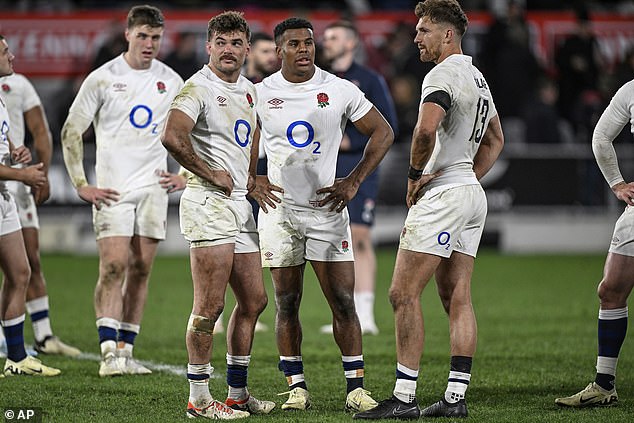
England’s new rules are simply not going far enough in terms of developing our young players
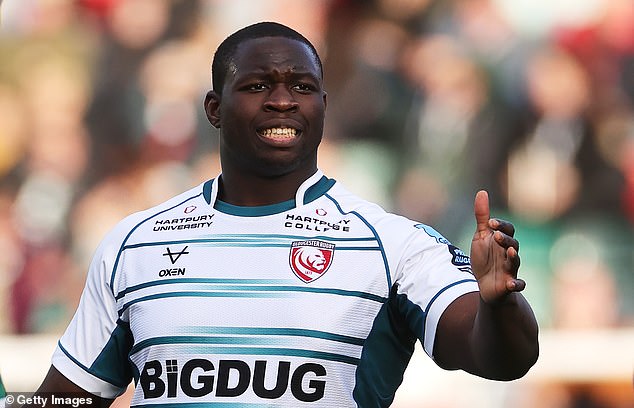
More needs to be done to allow young English players like Afolabi Fasogbon a chance to shine


You could make a case that Bath’s Finn Russell (left) and Leicester’s Handre Pollard (right) are the only ‘world class’ non-English players employed at Premiership club this season
The fact the competition is now a 10-team league also means that there are fewer jobs available. You could make a good argument to say that Finn Russell and Handre Pollard are the only ‘world-class’ non-English players employed at Premiership clubs this season.
For example, on the opening weekend of the Premiership season, Sale hosted Harlequins. Both sides started with South African-born locks. Of those four, only Stephan Lewies, the Harlequins captain, has represented the Springboks and that was back in 2014.
This totally contradicts the PGP vision. Do Sale and Harlequins not have any young English locks they should be giving a chance to? In the past, the Kolpak rule – which allowed players from South Africa and the Pacific Islands to sign contracts with English clubs without having to be classed as foreign stars – meant that too often young English talent was marginalised.
Post-Brexit, the Kolpak rule no longer exists. However, it’s clear that the status quo of the past still exists to a degree.
As we know, the RFU does not allow players based at clubs outside of England to represent Steve Borthwick’s national side.
I have long disagreed with this rule. Owen Farrell, Jack Willis, Henry Arundell and Kyle Sinckler are just four of many France-based stars who would certainly add depth and value to the vision of England being the No 1 team in the world. Every England coach needs to work in a no-excuse environment.
Having their hands tied behind their back over non-selection of overseas players is plain crazy.
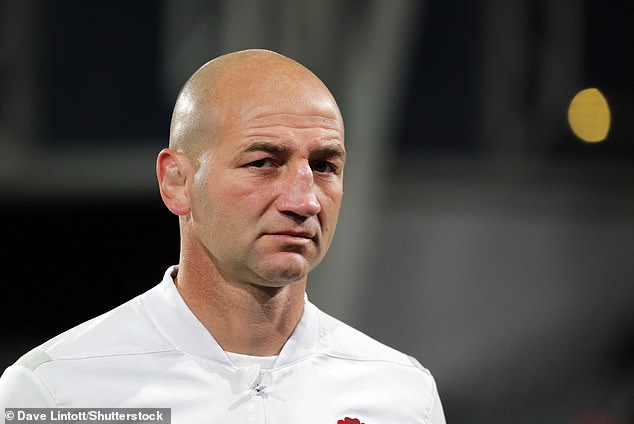
Players based at clubs outside of England cannot represent Steve Borthwick’s national side

Racing 92 fly-half Owen Farrell (above), is just one of several France-based stars who would certainly add depth and value to the vision of England being the No 1 team in the world

We are just shooting ourselves in the foot.
But with the RFU staying steadfast to their foreign dictat, then why are we not fully prioritising giving young English talent a chance in our own league?
Erasmus and South Africa have the best of both worlds and again, well done to him.
Their top players are based all over the world while their provinces are dominated by homegrown products. It’s no wonder Erasmus can select at least two world-class Springbok sides and their system has brought through new stars like Kurt-Lee Arendse and Sacha Feinberg-Mngomezulu among others.
I don’t agree with England copying the systems of other countries, but it’s clear they have had success elsewhere. Many of the game’s biggest stars are going to play in Japan, but their rules still protect the development of their own game. In Japan’s League One, each team can only have four foreign players on the field at any one time.
In France, each TOP14 squad must have a season average of 16 French in their matchday squads or face fines or points deductions.
It is abundantly clear this rule has helped France’s national side achieve success after years of poor performances.
Here’s hoping England’s EQP rulings follow suit and achieve similar results. But Borthwick’s chances of future success at Test level could only be improved if the EQP rulings were enhanced even further. Doing so would require brave and proactive decision making. But that is what is required to take England to No 1.
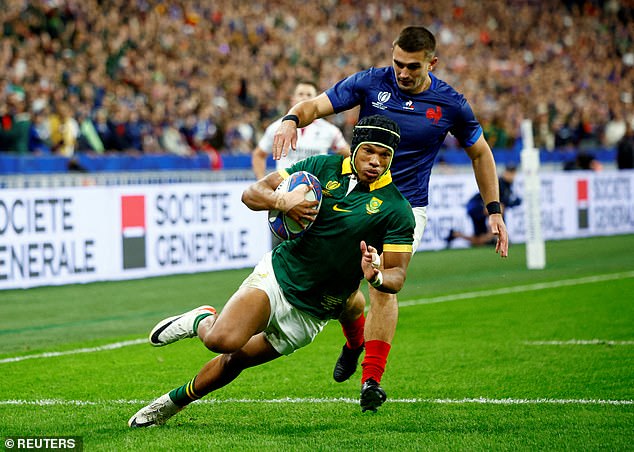
The shrewd South African system has helped Erasmus bring through bright young stars such as Kurt-Lee Arendse (above) and Sacha Feinberg-Mngomezulu, among many others
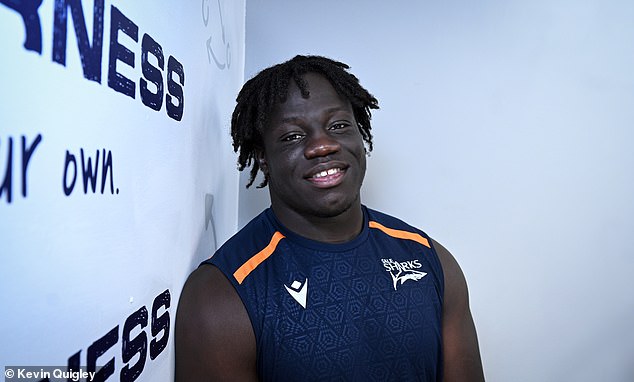
England need to be doing the same for young players such as Asher Opoku-Fordjour (above)

This summer, England’s Under-20 side won the Junior World Cup. The RFU ranks this cohort as one of the strongest age grade outfits the country has ever produced.
These players, such as Fasogbon, Asher Opoku-Fordjour, Craig Wright, Finn Carnduff and Henry Pollock are the future of the national side.
But out of the entire summer’s junior England squad, only two players featured in the Premiership’s opening round.
How will they be fast tracked into the senior England team if they are do not get a regular chance at club level?
Copyright for syndicated content belongs to the linked Source link
The post SIR CLIVE WOODWARD: Why England’s new rules do NOT go far enough in developing our players – the RFU needs to stop shooting itself in the foot and be more like South Africa first appeared on Rugby 247.
—-
Author : rugby-247
Publish date : 2024-10-21 16:39:06
Copyright for syndicated content belongs to the linked Source.